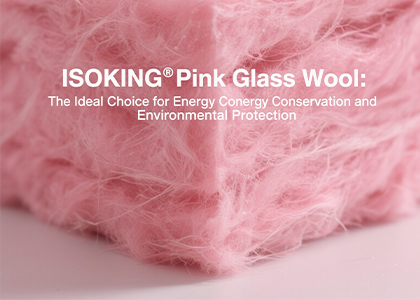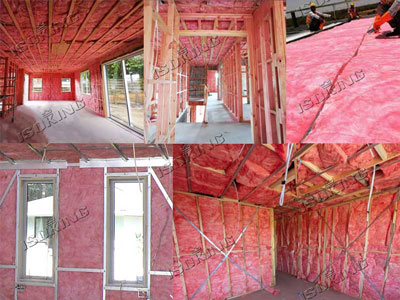ISOKING pink glass wool, with its excellent thermal performance, outstanding acoustic effect, and environmentally friendly and healthy properties, has become an ideal choice for modern building insulation and sound insulation. This article first outlines the product features of ISOKING pink glass wool, then explores its energy-saving performance, environmental protection characteristics, and main application scenarios, and puts forward practical suggestions for installation and maintenance, and finally summarizes its value in sustainable buildings.

ISOKING pink glass wool uses high melting point quartz sand and recycled glass as raw materials, and forms a fine and uniform fiber structure through centrifugal or rolling processes, presenting soft and elastic felt rolls or plate products.
The density of this material is generally in the range of 10–48 kg/m³, and the thickness and shape can be customized according to different application requirements.
During the production process, the addition of pink dye not only facilitates the rapid identification of the material but also improves the installation efficiency and construction accuracy.
Pink glass wool has excellent thermal resistance performance, and its typical thermal conductivity is only below 0.035 W/m·K, which can effectively reduce building energy consumption and reduce air conditioning and heating loads.
Studies have shown that using glass wool for insulation on roofs or exterior walls can reduce energy consumption by 20%–40%, significantly improving the overall energy efficiency of buildings.
By blocking thermal bridges and reducing heat radiation conduction, ISOKING Pink glass wool can still maintain stable thermal resistance under extreme climatic conditions, ensuring a comfortable and uniform indoor temperature.
ISOKING pink glass wool is completely free of harmful substances such as asbestos. It has been certified as an environmentally friendly product by the National Building Materials Testing Center. It is non-toxic and harmless and has no effect on human health.
The adhesive used in its manufacturing process is a thermosetting, environmentally friendly adhesive with extremely low volatile organic compound (VOC) content, which meets the strict standards of European REACH and US EPA.
A high proportion of recycled glass in the raw materials is reused, which makes the production process energy consumption lower and waste emissions lower. Less, truly green recycling.
The porous structure of pink glass wool fibers can effectively absorb noise, especially in the mid-high frequency band, and is often used in recording studios, cinemas, conference rooms, and other places with high acoustic requirements.
Compared with traditional yellow glass wool, the pink version is better in echo and reverberation control, and can increase indoor noise attenuation by more than 10%.
1. Building wall and roof insulation: widely used in exterior insulation systems (EIFS), sandwich panels, and roof panels, taking into account both thermal insulation and sound insulation requirements.
2. Pipeline and equipment insulation: Customized shell-and-tube products can be used in HVAC pipes, cold storage pipelines, and industrial equipment housings, which are quick to construct and easy to maintain.
3. Acoustic space transformation: In places with high requirements for the acoustic environment, such as recording studios, screening rooms, and conference centers, felt rolls or sound-absorbing panels can be used to improve the acoustic quality of the space.

Pink Glass Wool Application
1. Moisture-proof treatment: In environments where there is a preponderance of moisture, use moisture-proof film or aluminum foil surface material to block the ingress of vapor into the fiber layer to ensure long-term stable performance.
2. Cutting and fixing: It is recommended to use a professional glass wool cutter to ensure neat incisions, and use fasteners or metal buckles to fix, to avoid sagging or loosening of the material.
3. Regular inspection: Perform visual inspection and finger touch inspection every 1-2 years, remove surface dust in time, and check the integrity of the insulation layer to ensure the continued performance of the material.
ISOKING pink fiberglass has emerged as the leading material in modern building energy conservation and acoustic renovation because of its multiple advantages, low thermal conductivity, high sound absorption, and environmentally friendly and easy construction. Either a new project or an existing building application of this product can realize great measures in energy consumption reduction, comfort improvement, and environmental compliance, so it will provide a solid guarantee for the development of sustainable buildings.
If you have purchasing needs for high-quality pink glass wool or want to know more details, please contact our IKING Group and let us provide you with high-quality customized services.